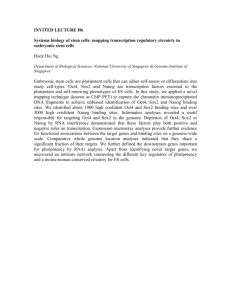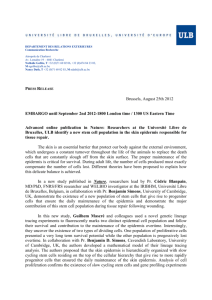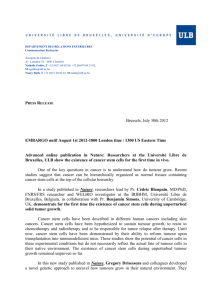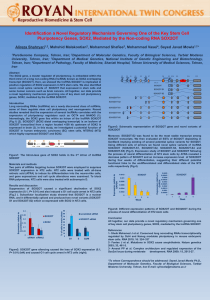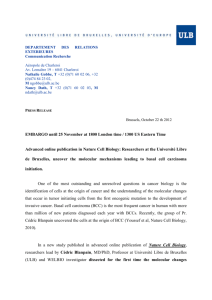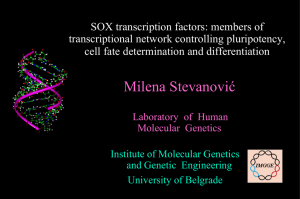DEPARTEMENT DES RELATIONS EXTERIEURES Communication
advertisement
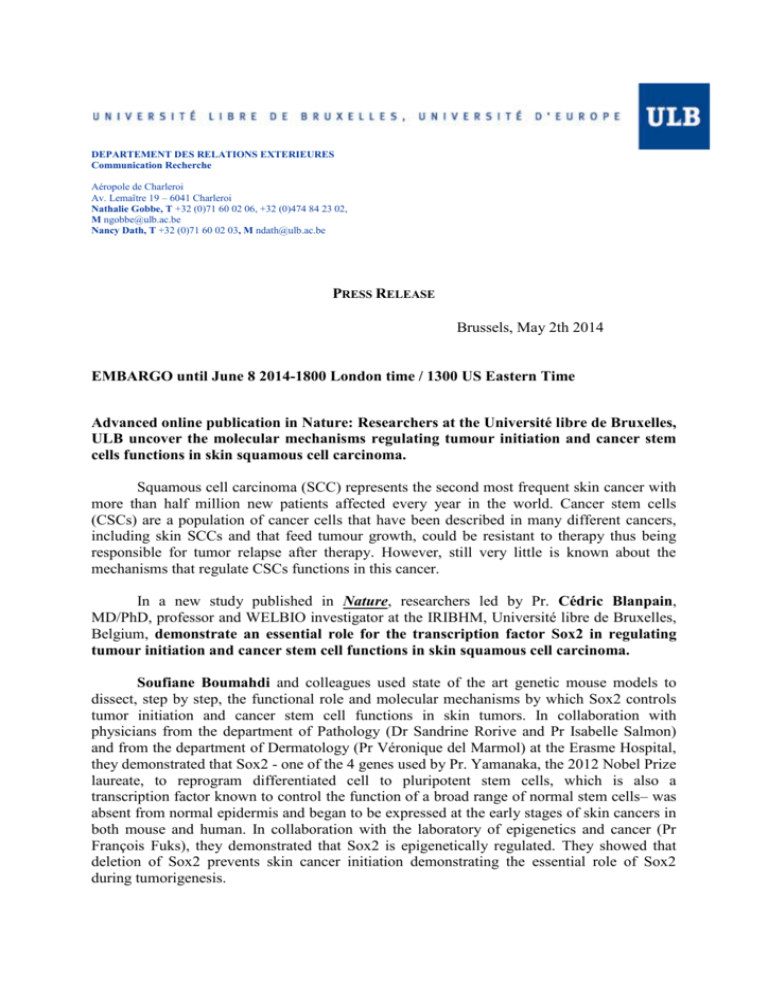
DEPARTEMENT DES RELATIONS EXTERIEURES Communication Recherche Aéropole de Charleroi Av. Lemaître 19 – 6041 Charleroi Nathalie Gobbe, T +32 (0)71 60 02 06, +32 (0)474 84 23 02, M ngobbe@ulb.ac.be Nancy Dath, T +32 (0)71 60 02 03, M ndath@ulb.ac.be PRESS RELEASE Brussels, May 2th 2014 EMBARGO until June 8 2014-1800 London time / 1300 US Eastern Time Advanced online publication in Nature: Researchers at the Université libre de Bruxelles, ULB uncover the molecular mechanisms regulating tumour initiation and cancer stem cells functions in skin squamous cell carcinoma. Squamous cell carcinoma (SCC) represents the second most frequent skin cancer with more than half million new patients affected every year in the world. Cancer stem cells (CSCs) are a population of cancer cells that have been described in many different cancers, including skin SCCs and that feed tumour growth, could be resistant to therapy thus being responsible for tumor relapse after therapy. However, still very little is known about the mechanisms that regulate CSCs functions in this cancer. In a new study published in Nature, researchers led by Pr. Cédric Blanpain, MD/PhD, professor and WELBIO investigator at the IRIBHM, Université libre de Bruxelles, Belgium, demonstrate an essential role for the transcription factor Sox2 in regulating tumour initiation and cancer stem cell functions in skin squamous cell carcinoma. Soufiane Boumahdi and colleagues used state of the art genetic mouse models to dissect, step by step, the functional role and molecular mechanisms by which Sox2 controls tumor initiation and cancer stem cell functions in skin tumors. In collaboration with physicians from the department of Pathology (Dr Sandrine Rorive and Pr Isabelle Salmon) and from the department of Dermatology (Pr Véronique del Marmol) at the Erasme Hospital, they demonstrated that Sox2 - one of the 4 genes used by Pr. Yamanaka, the 2012 Nobel Prize laureate, to reprogram differentiated cell to pluripotent stem cells, which is also a transcription factor known to control the function of a broad range of normal stem cells– was absent from normal epidermis and began to be expressed at the early stages of skin cancers in both mouse and human. In collaboration with the laboratory of epigenetics and cancer (Pr François Fuks), they demonstrated that Sox2 is epigenetically regulated. They showed that deletion of Sox2 prevents skin cancer initiation demonstrating the essential role of Sox2 during tumorigenesis. Using genetic tools to isolate Sox2 expressing cells from skin cancers, Soufiane Boumahdi and colleagues found that Sox2 marks a population of cancer stem cells with enhanced capacity to reform tumor upon transplantation. The ablation of the Sox2-positive cancer cell population leads to a rapid shrinkage of the tumors, demonstrating for the first time that Sox2 marks a population of cells playing a critical role in tumour maintenance in vivo within their natural environment. “It was really amazing to see how rapidly the tumors were shrinking and eventually completely disappeared by eliminating only one subpopulation of the cancer cells” comments Soufiane Boumahdi, the first author of this study. The researchers found new cancer stem cells biomarkers expressed by Sox2 positive cells that can be potentially used in the future to define new predictive markers in cancers and/or develop new therapeutic strategies to eliminate or impair cancer stem cells. They also uncovered a novel gene network regulated by Sox2 that controls many essential aspects of cancer functions. In conclusion, this work identifies Sox2 as marking a continuum in skin tumorigenesis from the early steps of cancer initiation to the control of cancer stem cell functions in invasive cancer. “It is fascinating to see how cancer cells reuse some of the normal developmental programs to sustain their proliferation and expansion. Also, given the broad diversity of cancers expressing Sox2, the identification of new markers expressed by Sox2-positive cancer stem cells and the genes regulated by Sox2 to sustain the proliferation and progression of skin cancers are likely to be relevant for other cancers and for the development of novel strategies to target cancer stem cells.” comments Pr Cédric Blanpain, the last and corresponding author of this study. This work was supported by the FNRS, the « Brain back to Brussels » program from the Brussels Region, a research grant from the Fondation Contre le Cancer, the ULB foundation, the Fonds Gaston Ithier, the Fonds Yvonne Boël and the foundation Bettencourt Schueller. Cédric Blanpain is an investigator of WELBIO and is supported by a starting grant of the European Research Council (ERC) and the EMBO Young Investigator Program. Journalists should seek to credit Nature as the source of the covered story. Soufiane Boumahdi, Gregory Driessens, Gaelle Lapouge, Sandrine Rorive, Dany Nassar, Marie Le Mercier, Benjamin Delatte, Amélie Caauwe, Sandrine Lenglez, Erwin Nkusi, Sylvain Brohée, Isabelle Salmon, Christine Dubois, Veronique del Marmol, Francois Fuks, Benjamin Beck and Cédric Blanpain. Sox2 controls tumour initiation and cancer stem-cell functions in squamous-cell carcinoma. Nature 2014, DOI:10.1038/nature13305 Press Contacts: Cédric Blanpain, MD, PhD WELBIO, Interdisciplinary Research Institute (IRIBHM) Université Libre de Bruxelles (ULB) 808, route de Lennik, BatC, C6-130 1070 Bruxelles, Belgium Tel: +32-2-555 4175 Email: Cedric.Blanpain@ulb.ac.be Lab Website: http://blanpainlab.ulb.ac.be/index.htm PA Nathalie Moguet: nmoguet@ulb.ac.be Tel : +32-2-555 4135
